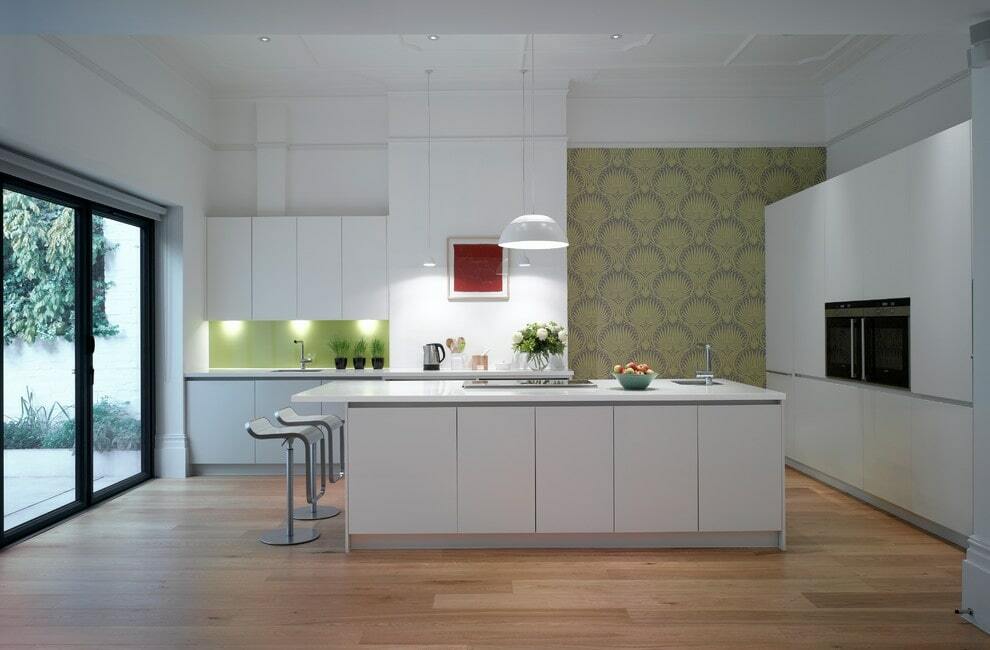Modern country house - is not just about its own to grow crops. Many use it for friendly parties, picnics, outdoor activities, and someone who likes to live in it, away from the noisy streets and stuffy city air. water heating garden - this is a great method to increase the comfort of living, to be able to use the house year-round, to stop using the inconvenient and inefficient mobile heaters. Ideally, puzzled design of this system should be at the stage of building a house, but with some diligence, installation can be performed in already finished building.

positive aspects
water heating in the suburban private home It has the following advantages:
- The principle of operation is very simple, carrier of thermal energy is hot water constantly circulates through the pipeline.
- Hosts can choose the best type of boiler, whether it is electric, wood or gas model.
- The method is suitable for villas, regardless of area and number of floors. Small buildings do not need wide pipe, but because the circuit looks aesthetically pleasing, does not require much effort during installation.
- When the correct calculation of water circulation takes place silently, home comfort remains at a high level.
- Owners can adjust the temperature, reducing fuel consumption, if there is no need for significant air heating.
General requirements
To not have problems with the reliability and effectiveness, it is recommended to follow some instructions:
- Warming risers retain the original temperature of the coolant, can help reduce fuel costs.
- If the total length of the pipes does not exceed 30 meters, efficient circulation of water can be achieved naturally. If the tube is initially have a large diameter and length, strongly recommended additional installation of the circulation pump, since the flow rate reduces the friction.
Choosing boiler

Heating country house It may be based on the use of the boiler of one of the following types:
- Gas apparatus. If there is a nearby natural gas pipeline, the alternatives have such a choice is not easy, due to the cost of a cubic meter of fuel. Of course, the need to spend time and effort to obtain numerous permits, but the result justifies the means.
- Solid fuels. Not a bad option for rural areas where firewood is always in abundance. From the point of view of profitability is also quite a decent selection. Unfortunately, we have to put up with certain operational inconveniences, the need to regularly enclose the wood in the firebox.
- Electrical modification. Compact, reliable and easy-to-use option, which, unfortunately, not very economical kilowatt price is increasing every year. In addition, the network is often worn in the private sector, no different voltage stability, which is detrimental to the modern devices.
- Liquid fuel. Not the best option for giving. Firstly, burning diesel provokes the formation of large amounts of combustion products deposited on the soil used for growing crops. Secondly, there can be problems with the supplying of fuel.
If we talk about power, it requires about 1.75 kWh per 10 square squares for cold climate regions. For warm areas, this option is limited kilowatts.
See also: water heating private houses.
Choosing a coolant
Durability and efficiency of the system, largely depends on the used coolant. low quality liquid saturated salts that can corrode the pipe for a few months, provoke heavy corrosion and lime deposits, reducing the original diameter repeatedly.
Practice shows that the best heating the solution presented in the following embodiments:
- Saline. Dilution water salt ensures that it does not begin to freeze at zero degrees, and when minus 20, which enhances security.
- Heat transfer fluid based on glycerol. An expensive option, but only one filling is enough to fill the circuit. Glycerol transcend even the extremely low temperatures of minus 30 degrees. Thus, long-term absence of visiting garden heating can be turned off without the risk of rupture of the pipes.
- Propylene glycol. Cheaper than the previous formulation is safe, but is characterized by a not very good thermal capacity and fluidity.

We also recommend: insulation holiday home for winter residence.
Choosing a pipe
In this regard, much depends on the financial capacity of the owners:
- Steel - inexpensive embodiment is characterized, however, susceptibility to corrosion of not too durable.
- Copper - very expensive metal, and readily withstand pressure differentials and low quality heat transfer medium capable of serving decades without changing original characteristics.
- Metal-plastic - modern material having sufficient strength at affordable price. Tubes are flexible, which simplifies the installation process. The main disadvantage - the possibility of damage in the event of a sharp temperature drop.
- Polypropylene. Modern plastic material which can withstand shocks, pressure and temperature jumps. When installing using special heating device, forming seams, like welding.
The amount and type of circulation pipes
Water heating in the country with their own hands formed with the following number of pipes:
- One pipe. Closed system, which is connected in series to the battery. The coolant passes through the radiators, and then returned to the boiler for heating. Advantages techniques is the simplicity of installation and financial savings, as the overrun material is excluded. Unfortunately, the technique is only for houses with an area less than 100 squares, assumes the risk of a full stop at an accident, even on one of the panels.
- Two tubes. One coolant pipe going to the batteries, on the other - is returned to the boiler. Consumption of the time and materials in this situation increases, but it becomes possible to use the pipe small diameter, as well as the resiliency of the system is guaranteed, as the batteries are connected parallel.
Speaking of the circulation type, the natural simpler embodiment eliminates the dependence on the stable power supply, but involves mounting large-diameter pipes. Installation of the circulation pump allows to install any pipe, but stops when the entire system is turned off electricity supply.
Thus effectively warm your holiday home you can for the time-tested traditional method. Water scheme ensures that the building will be comfortable even in the most severe frost!


